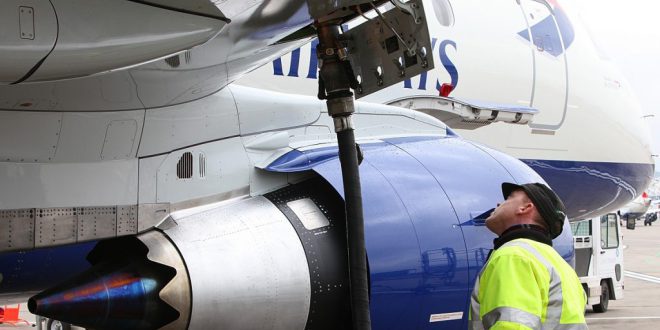News
Nigerian professor makes research breakthrough on aviation fuel handling

A Professor of Microbiology at the University of Ilorin, Albert Olayemi, has made a scientific breakthrough in the microbiological analysis of aviation fuel and fuel handling systems, towards enhancing the quality of fuel supply to the nation’s aviation sector.
The research, entitled “Microbial Contamination of JetFuel and Fuel Handling Systems”, was commissioned and sponsored by CITA Petroleum Limited, Lagos.
Described as the first of its kind in Sub-Saharan Africa, Mr. Olayemi’s research was recently published on Amazon and is said to be garnering intense critical acclaim in national and international media.
As a result of the research’s potential and possible impact on the global aviation industry, the International Air Transport Association (IATA) has invited Mr. Olayemi to make a presentation at the forthcoming Aviation Systems Management Symposium, being hosted by IATA in Miami, Florida, USA, between April 15 and 20, 2018.
The study urged quality control agencies to intensify monitoring to enhance the quality of supply to the aviation industry while also recommending, among others, the incorporation of microbiological standards into the specification requirements of Jet A1/allied products.
Microbial are micro-organisms like bacteria and fungi that are capable of existing in water where it interfaces with fuel. These micro-organisms use alkanes and additives in fuel as foodstuff. The most destructive of the microbes that grows in the aircraft fuel environment is the fungus Hormoconis resinae. It is the most common cause of microbial corrosion in aircraft fuel tanks.
At the presentation of the study report in Lagos recently, Mr. Olayemi commended the management of CITA Petroleum for compliance with the numerous industry and company’s proprietary Policies, Standards and Procedure (PSP) covering the entire supply storage and distribution chain.
Having drawn samples from CITA tank farms at various locations, the study attested that microbial contamination has been contained within the International Air Transport Association (IATA) guidelines, which ensure that fuel is on-specification at point of delivery to aircraft.
Contaminated fuel is one of the causes of equipment failure, which is the second leading cause of plane crashes globally, after pilot errors.
The study was aimed at assessing microbial contamination of aviation fuel and fuel handling system at CITA Petroleum Tank Farms located in Lagos, Port-Harcourt and Abuja.
The six points on the storage facilities selected for sampling included the bulk fuel, the oil-water surface, the bottom water, the inlet and discharge filters as well as sludge from the separation tanks and environmental surfaces. Samples were collected on three different occasions between September 2014 and May 2015 representing rainy, harmattan and onset of rainy season, in order to evaluate the effect of seasonality on the detection and frequency of occurrence of the microbial contaminants.
Mr. Olayemi, who lectures at the Department of Microbiology, University of Ilorin, said though the work might not be enough to establish microbiological quality standards to classify Nigerian fuel (aviation) and fuel handling system, it is nonetheless a first approach to underscore the importance of microbial contamination in aviation fuel and safety. The researcher said that based on the findings, it is recommended that the current practice of removing accumulated bottom water be sustained, coupled with periodic tank cleaning.
According to Unilorin Bulletin, he said,“Since most of the microbes are located in the aqueous phase of the water – hydrocarbon interface, the main way to avoid growth and fuel spoilage is removing the accumulated water.
“Although it may be difficult to prevent microbial contamination because of the impossibility of maintaining sterile conditions in the farm tanks and during transportation, its negative effects can be diminished.”
He added that the combined monitoring and preventive action costs would normally be less than the costs associated with crises response strategy.
The researcher, who is a former Deputy Vice-Chancellor of the University of Ilorin, is a PhD holder in Microbiology with many years of teaching, research and community service experiences. He has authored numerous journal articles and books in the areas of water, environmental health and hydrocarbon microbiology.
-
Society News4 years ago
Jamaican man beheads wife after finding out their 6 kids are not his
-
Society News6 years ago
EXCLUSIVE: The Complete Story of Dolapo Awosika, John Fashanu and Prophet Kasali Sex Mess
-
News4 years ago
Pastor Osagie Ize-Iyamu, His Membership Of Secret Cult, And Other Issues Touching On His Public Credentials Examined by Barr. PATRICK I. BIOSE
-
News4 years ago
BREAKING: Ajimobi’s daughter-in-law blast Gov. Makinde, says gov can’t surpass ex-Oyo gov
-
News4 years ago
BREAKING: 2 arrested as NAF begins investigations into Tolulope’s death
-
Crime4 years ago
Exclusive: Female Aide Fingered In Oko Oloyun’s Murder + Banking Transactions That Nailed Husband
-
News4 years ago
BREAKING: Police take over Edo House of Assembly as APC, Oshiomhole move to seize control
-
News4 years ago
How Ex-EFCC Spokesman, Tony Orilade Buried Dad
Notice: Undefined variable: user_ID in /var/www/first2023/wp-content/themes/firstweekly/comments.php on line 48
You must be logged in to post a comment Login